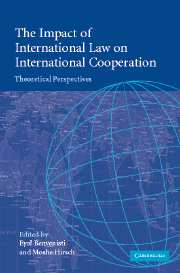Book contents
- Frontmatter
- Contents
- List of contributors
- Acknowledgments
- List of abbreviations
- 1 Introduction
- 2 International law and international relations theory: a prospectus
- 3 Pathways to international cooperation
- 4 Customary international law as a judicial tool for promoting efficiency
- 5 Reputation, compliance and development
- 6 Rethinking compliance with international law
- 7 Compliance with international norms in the age of globalization: two theoretical perspectives
- 8 Compliance and non-compliance with international norms in territorial disputes: the Latin American record of arbitrations
- 9 International trade and domestic politics: the domestic sources of international trade agreements and institutions
- 10 Human rights, developing countries and the WTO constraint: the very thing that makes you rich makes me poor?
- 11 Back to court after Shrimp–Turtle: India's challenge to labor and environmental linkages in the EC generalized system of preferences
- Index
7 - Compliance with international norms in the age of globalization: two theoretical perspectives
Published online by Cambridge University Press: 06 July 2009
- Frontmatter
- Contents
- List of contributors
- Acknowledgments
- List of abbreviations
- 1 Introduction
- 2 International law and international relations theory: a prospectus
- 3 Pathways to international cooperation
- 4 Customary international law as a judicial tool for promoting efficiency
- 5 Reputation, compliance and development
- 6 Rethinking compliance with international law
- 7 Compliance with international norms in the age of globalization: two theoretical perspectives
- 8 Compliance and non-compliance with international norms in territorial disputes: the Latin American record of arbitrations
- 9 International trade and domestic politics: the domestic sources of international trade agreements and institutions
- 10 Human rights, developing countries and the WTO constraint: the very thing that makes you rich makes me poor?
- 11 Back to court after Shrimp–Turtle: India's challenge to labor and environmental linkages in the EC generalized system of preferences
- Index
Summary
Introduction
The subject of compliance with international norms has recently attracted significant attention of scholars from both the international law and international relations disciplines. The former, rather skeptical attitude of many scholars regarding the compliance of states with international law has largely shifted to a more favorable appraisal. The widespread view in the current literature embraces the famous statement of Louis Henkin that “almost all nations observe almost all principles of international law and almost all of their obligations almost all of the time.” Less preoccupied with the question of how much compliance, scholars now pose the more intriguing question of why compliance is prevalent in the international community. This question challenges scholars of international law and international relations to identify the major factors that motivate states to observe or violate their international obligations.
The process of globalization raises numerous questions for social scientists regarding the ramifications of this phenomenon in a variety of spheres, including international law and international relations. The principal aim of this chapter is to analyze the likely repercussions of the process of globalization upon compliance with international norms. More precisely, the central question here is whether globalization is expected to enhance or lessen compliance with international norms (assuming that the process of globalization proceeds).
The answer to this important question is dependent to a significant measure upon the answer provided to the above question regarding the factors that affect compliance with international norms.
- Type
- Chapter
- Information
- The Impact of International Law on International CooperationTheoretical Perspectives, pp. 166 - 193Publisher: Cambridge University PressPrint publication year: 2004
- 2
- Cited by



